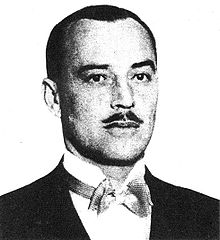George Lloyd, 1st Baron Lloyd
George Ambrose Lloyd, 1st Baron Lloyd , GCSI , KCIE , PC , ( September 19, 1879 - February 4, 1941 ) was a British politician .
Live and act
George Lloyd visited the English elite school Eton College before the 1901 to Trinity College of Cambridge University studied. In both 1899 and 1900 he took part in the Boat Race . In 1901 he joined the family business "Stewart and Lloyds Limited" in Birmingham , which had specialized in the manufacture of steel tubes. During the so-called "Edwardian Decade," Lloyd distinguished himself as a supporter of the collective bargaining reform movement led by Joseph Chamberlain . During this time he was also the United Kingdom's Honorary Consul in the Ottoman Empire, where he witnessed the Young Turkish Revolution.
In January 1910, Lloyd was elected to the House of Commons as a Conservative candidate for the West Staffordshire constituency. In 1911 he married Blanche Lascelles. During the First World War , Lloyd served as an officer on Sir Ian Hamilton's staff. In this capacity he experienced, among other things, the landing on Gallipoli in 1915 before he worked briefly in Cairo. Lloyd then worked with TE Lawrence , whom he helped coordinate the Arab revolt against the Ottomans.
Together with Edward Wood , Lloyd wrote the book The Great Opportunity , which was intended as a manifesto of a purely conservative alternative to the program of the coalition government of conservatives and liberals led by the liberal David Lloyd George .
In December 1918, Lloyd was appointed governor of Bombay , where he distinguished himself primarily through extensive construction work. After the end of his tenure as governor in 1922, he was appointed Privy Counselor, a member of the British Privy Council. In the 1920s, Lloyd served as the UK High Commissioner in Egypt before Foreign Secretary Arthur Henderson forced his resignation.
In 1924 Lloyd returned to Parliament as a MP for the Eastbourne constituency. In 1925 he was raised to the hereditary nobility with the title Baron Lloyd , of Dolobran in the County of Montgomery. A hereditary seat in the House of Lords was associated with the title . He had to give up his seat in the House of Commons for this. In the 1930s, Lloyd appeared alongside his party colleagues Leopold Amery and Winston Churchill as one of the main critics of the granting of a home rule for India. In the war government formed in 1940 under Winston Churchill, Lloyd served as Secretary of State for the Colonies (from May 1940) and as leader of the House of Lords (December 1940).
After his death, Lloyd was buried in St. Ippolyt's Cemetery at Cloud's Hill. His only son, Alexander Lloyd, 2nd Baron Lloyd, inherited his title of nobility .
literature
- John Charmley : Lord Lloyd and the decline of the British Empire. 1987.
- Colin GF Adams: Life of Lord Lloyd. With a forword by Winston Churchill. Macmillan, London 1948.
Web links
- Newspaper article about George Lloyd, 1st Baron Lloyd in the press kit of the 20th century of the ZBW - Leibniz Information Center for Economics .
| predecessor | Office | successor |
|---|---|---|
| New title created |
Baron Lloyd 1925-1941 |
Alexander Lloyd |
| personal data | |
|---|---|
| SURNAME | Lloyd, George, 1st Baron Lloyd |
| ALTERNATIVE NAMES | Lloyd, George Ambrose, 1st Baron Lloyd |
| BRIEF DESCRIPTION | British politician, member of the House of Commons |
| DATE OF BIRTH | September 19, 1879 |
| DATE OF DEATH | February 4, 1941 |
